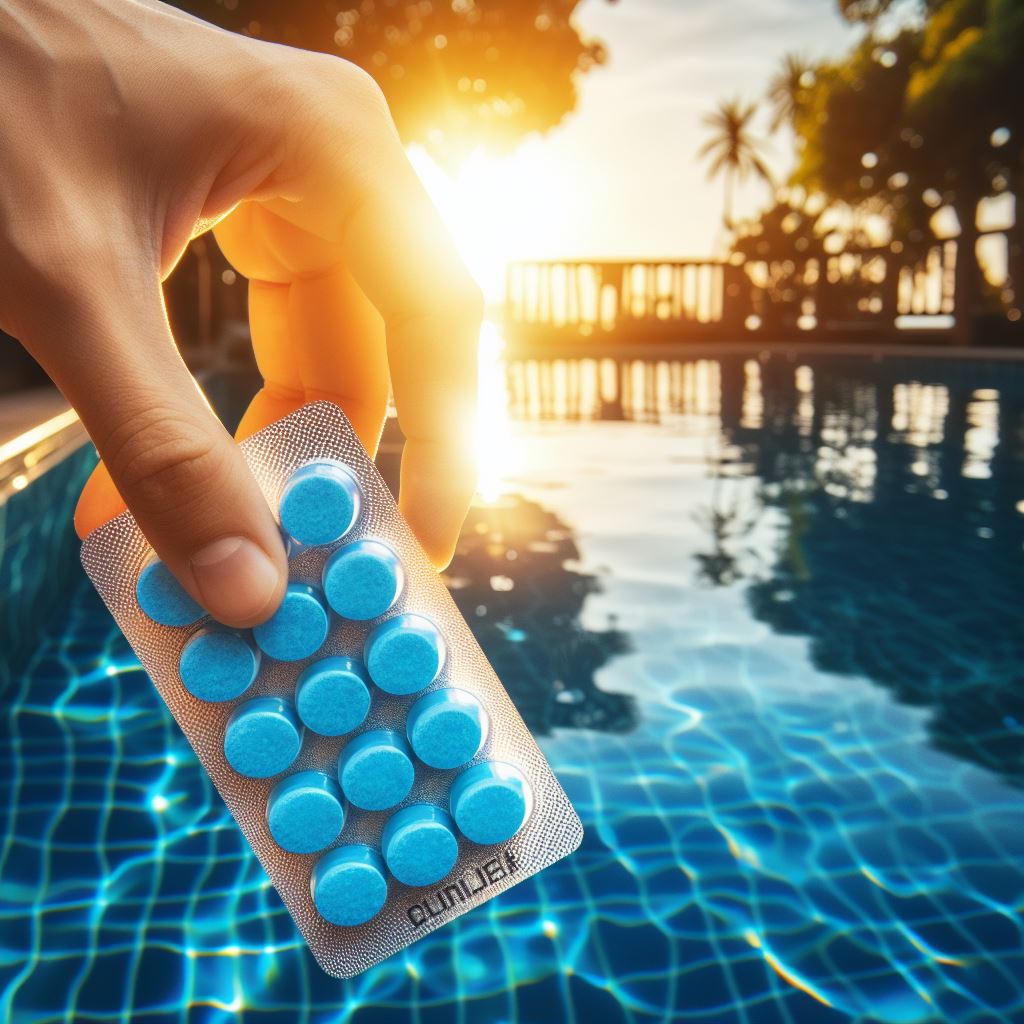Pool chlorine tablets are vital for maintaining proper disinfection levels in swimming pools, ensuring water clarity and safety for swimmers. The quality and effectiveness of chlorine tablets depend significantly on the selection of raw materials used in their production process. This article explores the importance of raw material selection in the manufacturing of pool chlorine tablets, highlighting key factors considered, such as chemical composition, purity, stability, and environmental impact.

Understanding Pool Chlorine Tablets
Pool chlorine tablets, also known as trichloroisocyanuric acid tablets, are solid chemical compounds used for pool disinfection. These tablets contain stabilized chlorine compounds that dissolve gradually in water, releasing chlorine to sanitize and disinfect the pool water continuously.
Importance of Raw Material Selection
a. Chemical Composition: The chemical composition of raw materials used in chlorine tablet production is critical for ensuring the desired chlorine content and stability of the tablets. Key raw materials include trichloroisocyanuric acid (TCCA) or other chlorine-containing compounds, along with binders, stabilizers, and additives.
b. Purity: High purity raw materials are essential to minimize impurities that could affect the quality and effectiveness of chlorine tablets. Impurities in raw materials may lead to undesirable byproducts, reduced disinfection efficacy, or potential health hazards.
c. Stability: Raw materials with good stability characteristics ensure the long-term effectiveness and shelf-life of chlorine tablets. Stability considerations include resistance to moisture, heat, and light, which can affect the integrity and performance of the tablets.
d. Environmental Impact: The environmental impact of raw materials used in chlorine tablet production is an important consideration for sustainability and eco-friendliness. Environmentally friendly raw materials that minimize pollution, resource depletion, and greenhouse gas emissions are preferred.
Key Raw Materials and Selection Criteria
a. Trichloroisocyanuric Acid (TCCA): TCCA is a primary raw material used in chlorine tablet production due to its high chlorine content and stability. When selecting TCCA, factors such as purity level, particle size, solubility, and moisture content are considered to ensure optimal tablet performance.
b. Binders and Stabilizers: Binders are used to hold the chlorine tablet ingredients together, while stabilizers help prevent chlorine degradation and maintain tablet integrity. Common binders include cellulose derivatives or polymers, while stabilizers may include cyanuric acid or other additives to enhance tablet stability.
c. Additives: Additives such as clarifiers, algaecides, and pH adjusters may be included in chlorine tablets to provide additional water treatment benefits. When selecting additives, compatibility with other tablet ingredients and effectiveness in achieving desired water treatment goals are key considerations.
Quality Assurance Measures
a. Supplier Qualification: Pool chlorine tablet manufacturers carefully select raw material suppliers based on their reputation, reliability, and compliance with quality standards and regulations. Supplier qualification processes may include audits, quality assessments, and certification requirements.
b. Raw Material Testing: Incoming raw materials undergo rigorous testing and quality control measures to verify their chemical composition, purity, stability, and compliance with specifications. Testing methods may include chemical analysis, physical property testing, and performance evaluation.
c. Batch-to-Batch Consistency: Maintaining consistency in raw material quality and characteristics is essential for ensuring consistent tablet performance and efficacy. Quality assurance measures include monitoring and controlling raw material variability, batch testing, and process control procedures.
d. Compliance with Regulations: Pool chlorine tablet manufacturers adhere to relevant regulations and industry standards governing raw material quality, safety, and environmental impact. Compliance with regulations such as those set by regulatory agencies and industry organizations ensures the safety and efficacy of chlorine tablets for pool disinfection.
Environmental Considerations
a.Sustainable Sourcing: Pool chlorine tablet manufacturers prioritize sustainable sourcing practices for raw materials, including responsible procurement, resource conservation, and waste reduction initiatives.
b.Eco-Friendly Formulations: Manufacturers explore eco-friendly formulations and alternative raw materials that minimize environmental impact while maintaining product effectiveness and performance.
c.Recycling and Waste Management: Manufacturers implement recycling and waste management initiatives to minimize waste generation and promote the reuse or recycling of raw materials and packaging materials.
Conclusion
In conclusion, the selection of raw materials is a critical aspect of the production process for pool chlorine tablets, influencing their quality, effectiveness, and environmental impact. Pool chlorine tablet manufacturers carefully evaluate raw materials based on factors such as chemical composition, purity, stability, and environmental considerations. Quality assurance measures, including supplier qualification, raw material testing, batch-to-batch consistency, and compliance with regulations, ensure the safety and efficacy of chlorine tablets for pool disinfection. By prioritizing sustainable sourcing practices and eco-friendly formulations, manufacturers can minimize environmental impact and promote responsible stewardship in the production of pool chlorine tablets.

 Instant
Quote
Instant
Quote Email
Us
Email
Us